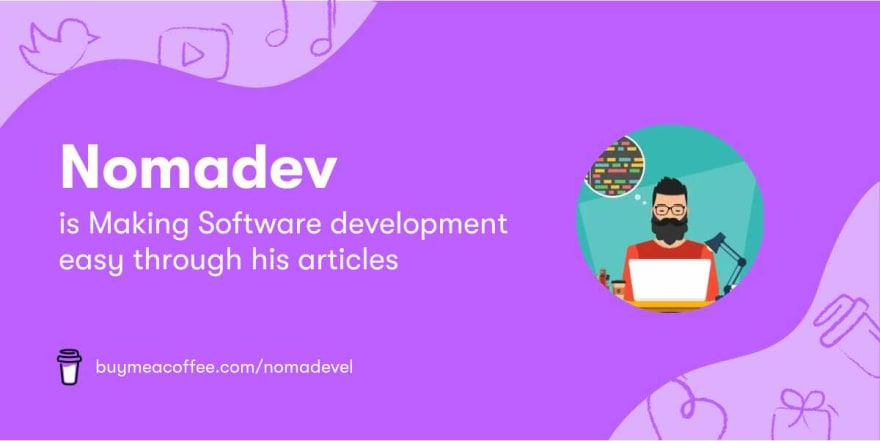An Interest In:
Web News this Week
- April 2, 2024
- April 1, 2024
- March 31, 2024
- March 30, 2024
- March 29, 2024
- March 28, 2024
- March 27, 2024
Some of Our Sources
View All SourcesDive Into the World of Open Source: From Novice to Contributor in 6 Steps
Open source software has revolutionized the way we create, collaborate, and share information. From operating systems and web browsers to scientific research and data analysis, open source has transformed the way we interact with technology. If you're interested in getting involved in the open source movement, this article is for you. I'll provide a comprehensive guide to getting started as a contributor, including tips for finding the right project, setting up a development environment, and making your first contribution. Hello fellow devs, Nomadev is here with another tech blog, Whether you're a beginner looking to dip your toes into the world of open source or an experienced developer looking to expand your horizons, this guide has something for everyone. So let's get started!
Here are 6 Best steps to go from Novice to Contributor:
1. Understanding the basics of open source:
Open source software is software that is freely available for anyone to use, modify, and distribute. It is typically developed by a community of volunteers who work together to improve and enhance the software. Open source software is different from proprietary software, which is owned by a company and is typically not available for free or for modification.
Using open source software can have a number of benefits, such as access to a wide range of tools and resources, the ability to customize and modify software to meet specific needs, and the opportunity to collaborate with other developers around the world. It can also be a great way to learn and improve your skills, as you can see how other developers approach problem-solving and code design.
2. Finding open source projects to contribute to:
One of the exciting things about open source is the vast array of projects that you can contribute to. From operating systems and web browsers to scientific research and data analysis, there are open source projects in virtually every field. The key to finding a project that is right for you is to align your interests and skills with the needs of the project.
There are a number of ways to search for open source projects to contribute to. Some popular resources include:
Open Source Directories: Websites like GitHub and Open Source Projects list thousands of open source projects in a variety of fields. You can search by language, topic, and other criteria to find projects that match your interests and skills.
Project Websites: Many open source projects have their own websites, where they provide information about their goals, roadmap, and how to get involved.
Open Source Communities: Joining open source communities, such as forums, mailing lists, and Slack groups, can be a great way to find projects and connect with other contributors.
Some tips and resources for finding open source projects to contribute to:
Identify your interests and skills: Think about the topics and technologies that you are passionate about and have experience in. This will help you find projects that align with your interests and skills.
Search open source directories: Websites like GitHub and Open Source Projects list thousands of open source projects in a variety of fields. You can search by language, topic, and other criteria to find projects that match your interests and skills.
Check out project websites: Many open source projects have their own websites, where they provide information about their goals, roadmap, and how to get involved.
Join open source communities: Participating in open source communities, such as forums, mailing lists, and Slack groups, can be a great way to find projects and connect with other contributors.
Ask for recommendations: Reach out to friends, colleagues, or mentors who are involved in open source and ask for recommendations on projects to contribute to.
3. Setting up a development environment:
Before you can start contributing to an open source project, you'll need to set up a development environment on your local machine. This will allow you to write, test, and debug code before you submit it to the project.
The process for setting up a development environment will depend on the tools and technologies used by the project you are contributing to. Here are some general steps you can follow:
Install the required software: This may include a code editor, version control system, and any other tools or libraries used by the project.
Clone the project's repository: Use version control software (e.g., Git) to clone the project's repository to your local machine.
Install dependencies: Follow the project's instructions for installing any dependencies that are required to run the project locally.
Set up a local server: If the project requires a local server (e.g., for a web application), set one up using the appropriate software (e.g., Apache, Nginx).
4. Getting involved in the open source community:
One of the great things about open source is the sense of community that comes with it. Contributing to an open source project is an opportunity to connect with like-minded individuals from around the world and collaborate on something bigger than yourself.
There are a number of ways to get involved in the open source community:
Join the project's community: Many open source projects have their own communities, where contributors and users can connect, discuss issues, and share ideas. These communities may include forums, mailing lists, or Slack groups.
Attend events: Open source events, such as conferences, meetups, and hackathons, are a great way to meet other contributors and learn more about the project.
Contribute regularly: The more you contribute to a project, the more you will become a part of the community. Consider setting aside regular time to contribute to the project and engage with other contributors.
5. Making your first contribution
Making your first contribution to an open source project can be intimidating, but it is also an exciting and rewarding experience. By contributing to a project, you are not only making a difference, but you are also learning and improving your skills.
Here is a step-by-step guide for making your first contribution:
Find an issue to work on: Many open source projects use issue tracking systems (e.g., GitHub Issues) to manage bugs, feature requests, and other tasks. Look for issues that are labeled as "beginner-friendly" or "good first issue" to get started.
Comment on the issue: Let the project maintainers know that you are interested in working on the issue by commenting on the issue. This will help them know that you are interested in contributing and allow them to provide any necessary guidance.
Set up a development environment: Follow the project's instructions for setting up a development environment on your local machine.
Write code: Write code to address the issue you are working on, using the project's coding standards and guidelines.
Test and debug your code: Test your code to ensure that it works as expected and fix any bugs that you find.
Submit a pull request: Once you are satisfied with your code, submit a pull request to the project maintainers. They will review your code and provide feedback.
Following the project's guidelines and standards is important for ensuring that your contribution fits in with the rest of the project and is easy to understand and maintain. This may include things like coding style, file naming conventions, and documentation standards. By adhering to these guidelines, you are helping to maintain the overall quality and consistency of the project.
Project maintainers play a crucial role in reviewing and merging contributions to the project. They are responsible for overseeing the development of the project and ensuring that contributions align with the project's goals and standards. When you submit a pull request, the project maintainers will review your code and provide feedback. If your contribution is accepted, it will be merged into the project. If there are any issues with your contribution, the maintainers will provide feedback and may ask you to make changes.

6. Getting involved in the open source community:
Here are some tips for success as you get started with open source:
Start small: Don't be afraid to start with small contributions. Every contribution, no matter how small, can make a difference and help you build your skills.
Engage with the community: Participating in the project's community is a great way to learn, connect with other contributors, and get feedback on your contributions.
Be open to feedback: Receiving feedback is an important part of the learning process. Be open to feedback on your contributions and use it as an opportunity to improve and grow.
Keep learning: Open source is a great way to learn and improve your skills. Don't be afraid to try new things and take on more challenging tasks as you gain experience.
Have fun: Contributing to open source can be a fun and rewarding experience. Don't be afraid to have fun and enjoy the process!
Starting small, engaging with the community, being open to feedback, and continuing to learn and grow are all crucial to success in open source. By starting small, you can build your skills and confidence gradually. Engaging with the community allows you to learn from others, get feedback on your contributions, and connect with like-minded individuals. Being open to feedback is an important part of the learning process, and can help you improve and grow as a contributor. Finally, continuing to learn and grow is essential to success in open source. By seeking out new opportunities to learn and trying new things, you can keep your skills sharp and achieve success as a contributor.
I'll leave it at that, developers. I'll speak with you again soon and have additional information for you.
Follow me on Twitter for more daily insights
And are you tired of the daily commute and ready to take your career to the next level with a remote job? Look no further! The Remote Job Hunter's Handbook is here to guide you through the process of finding and landing your dream work-from-home opportunity.
With practical tips and real-life examples, this ebook covers everything you need to know about the remote job search, including how to:
- Identify the best remote job opportunities for your skills and experience
- Tailor your resume and cover letter for a remote job application
- Network and connect with remote employers
- Prepare for and ace virtual interviews
- Onboard and thrive in your new remote role
Don't miss out on this valuable resource for anyone looking to - join the growing number of professionals working remotely.
Get your copy of The Remote Job Hunter's Handbook today only on Gumroad
And if you want to appreciate my work you can buy me a coffee, Your appreciation is my motivation.
Original Link: https://dev.to/thenomadevel/dive-into-the-world-of-open-source-from-novice-to-contributor-in-6-steps-1bh1
Dev To
 An online community for sharing and discovering great ideas, having debates, and making friends
An online community for sharing and discovering great ideas, having debates, and making friendsMore About this Source Visit Dev To









